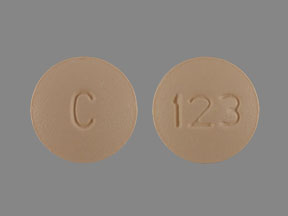
Topiramate Coupons & Savings Card – Discount Prices from $11.44
Generic for: Topamax, Topamax sprinkle, Eprontia
My prescription
Edit
50MG, Topiramate (60 Tablets)
Select pharmacy

CVS
$20.04
COUPON PRICE
Walgreens
$11.44
COUPON PRICE
Albertsons
$17.06
COUPON PRICE
Walmart
$17.21
COUPON PRICETopiramate savings card
Show this card to your pharmacist
Walgreens
$11.44
BIN
ID
PCN
GRP
019876
LH99506480
CHIPPO
LHX
Powered by
More prescriptions for migraine
More prescriptions for migraine
Price history for Topamax Sprinkle (brand) & Topiramate (generic)
60 Tablets, 50MG
Average retail price for Topamax Sprinkle
Average retail price for Topiramate
Average SaveHealth price for Topiramate
Our price history data is based on aggregated prescription data collected from participating pharmacies in America. Our prescription data updates daily to reflect the latest price changes. If you notice a missing data point, it means there wasn't sufficient data available to generate a monetary value for that date.
We analyzed Topiramate prices for (50MG, 60 Tablets) over the last 12 months. The average retail price was $49.76, while the average price using the SaveHealth discount card was $14.46. That's a savings of approximately 70.94% when using our Topiramate coupon.
Compared to the generic version, Topamax Sprinkle had an average price of $735.41 over the same time period. With the SaveHealth savings card, Topiramate is 98.03% cheaper on average than Topamax Sprinkle.
*Retail prices are based on pharmacy claims data, and may not be accurate when we don't have enough claims.
Topiramate dosage forms
Dosage Quantity Price from Per unit 25MG 1 Tablet $9.03 $9.03 25MG 15 Tablets $9.41 $0.63 25MG 30 Tablets $9.83 $0.33 25MG 60 Tablets $10.66 $0.18 25MG 90 Tablets $17.37 $0.19 25MG 100 Tablets $17.63 $0.18 25MG 120 Tablets $18.16 $0.15 25MG 180 Tablets $19.74 $0.11 25MG 270 Tablets $22.11 $0.08 25MG 500 Tablets $28.17 $0.06
| Dosage | Quantity | Price from | Per unit |
|---|---|---|---|
| 25MG | 1 Tablet | $9.03 | $9.03 |
| 25MG | 15 Tablets | $9.41 | $0.63 |
| 25MG | 30 Tablets | $9.83 | $0.33 |
| 25MG | 60 Tablets | $10.66 | $0.18 |
| 25MG | 90 Tablets | $17.37 | $0.19 |
| 25MG | 100 Tablets | $17.63 | $0.18 |
| 25MG | 120 Tablets | $18.16 | $0.15 |
| 25MG | 180 Tablets | $19.74 | $0.11 |
| 25MG | 270 Tablets | $22.11 | $0.08 |
| 25MG | 500 Tablets | $28.17 | $0.06 |
| 25MG | 1000 Tablets | $41.34 | $0.04 |
| 50MG | 60 Tablets | $11.44 | $0.19 |
| 50MG | 1 Tablet | $9.04 | $9.04 |
| 50MG | 7 Tablets | $9.28 | $1.33 |
| 50MG | 14 Tablets | $9.57 | $0.68 |
| 50MG | 15 Tablets | $9.61 | $0.64 |
| 50MG | 21 Tablets | $9.85 | $0.47 |
| 50MG | 30 Tablets | $10.22 | $0.34 |
| 50MG | 90 Tablets | $18.31 | $0.20 |
| 50MG | 100 Tablets | $18.68 | $0.19 |
| 50MG | 120 Tablets | $19.42 | $0.16 |
| 50MG | 180 Tablets | $21.63 | $0.12 |
| 50MG | 500 Tablets | $33.41 | $0.07 |
| 50MG | 1000 Tablets | $51.82 | $0.05 |
| 100MG | 1 Tablet | $9.06 | $9.06 |
| 100MG | 7 Tablets | $9.43 | $1.35 |
| 100MG | 15 Tablets | $9.92 | $0.66 |
| 100MG | 21 Tablets | $10.29 | $0.49 |
| 100MG | 28 Tablets | $10.72 | $0.38 |
| 100MG | 30 Tablets | $10.84 | $0.36 |
| 100MG | 45 Tablets | $11.76 | $0.26 |
| 100MG | 60 Tablets | $12.68 | $0.21 |
| 100MG | 90 Tablets | $20.45 | $0.23 |
| 100MG | 100 Tablets | $21.05 | $0.21 |
| 100MG | 120 Tablets | $22.26 | $0.19 |
| 100MG | 180 Tablets | $25.90 | $0.14 |
| 100MG | 500 Tablets | $45.27 | $0.09 |
| 100MG | 1000 Tablets | $67.50 | $0.07 |
| 200MG | 1 Tablet | $9.10 | $9.10 |
| 200MG | 15 Tablets | $10.52 | $0.70 |
| 200MG | 30 Tablets | $12.03 | $0.40 |
| 200MG | 60 Tablets | $15.06 | $0.25 |
| 200MG | 90 Tablets | $24.83 | $0.28 |
| 200MG | 180 Tablets | $34.66 | $0.19 |
| 200MG | 500 Tablets | $55.50 | $0.11 |
| 200MG | 1000 Tablets | $84.70 | $0.09 |
